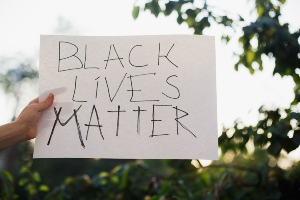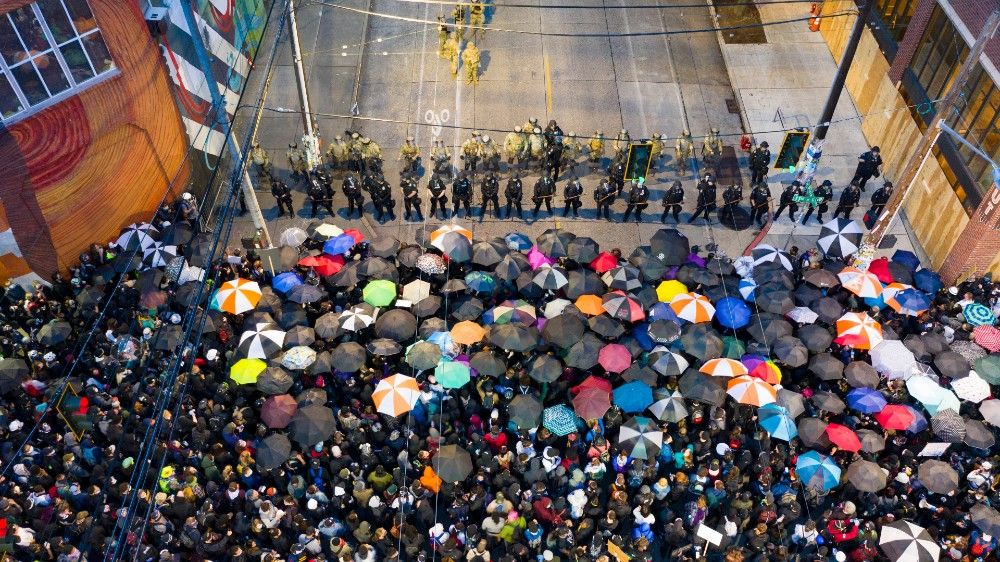Top Class Actions’s website and social media posts use affiliate links. If you make a purchase using such links, we may receive a commission, but it will not result in any additional charges to you. Please review our Affiliate Link Disclosure for more information.
Advocacy group Black Lives Matter and several citizens have launched a class action lawsuit against the city of Seattle, alleging unnecessary police brutality during recent peaceful protests over systemic racism and police violence.
Lead plaintiff Black Lives Matter of Seattle-King County, along with Abie Ekenezar, Sharon Sakamoto, Muraco Kyashna-tochá, Alexander Woldeab, Nathalie Graham and Alexandra Chen, say police actions during the protests have and continue to violate demonstrators’ constitutional rights.
Not only does the police department’s use of force harm peaceful protesters, it deters others from exercising their constitutional right to demonstrate, the class action lawsuit alleges.
“Simply put,” the complaint states, “in response to protests against police brutality, the police chose to engage in brutality.”
Despite apologies by Seattle’s mayor and police chief, the plaintiffs say instances of police violence against protesters continue.
“Seattle Mayor Jenny Durkan and SPD Chief Carmen Best have ‘apologized for instances in which they said officers may have failed to deescalate tense moments, used disproportionate force against demonstrators and deployed less-than-lethal weapons too quickly,’” the complaint states. “Plaintiffs seek injunctive relief because their apologies have not prevented and will not prevent the City’s ongoing violation of plaintiffs’ constitutional rights.”
According to the Black Lives Matter class action lawsuit, demonstrators rallied after yet another black person, George Floyd, died while being detained for a nonviolent offense by the police. Amidst allegations of excessive use of police force and murder, in this instance by a police officer who knelt on Floyd’s neck for nearly nine minutes, “I can’t breathe” became a rallying cry for protesters across the nation.
“Despite a global pandemic, groups of demonstrators throughout the country and the world, including in Seattle, have gathered to protest the systemic injustices perpetrated by law enforcement against Black people and other people of color,” the class action lawsuit states. “In response to these protests, the [Seattle Police Department] has exercised an overwhelming and unconstitutional use of force to discourage these protesters from exercising their constitutional rights.”
Indeed, say the plaintiffs, the Seattle Police Department has attempted to quash these demonstrations using “less than lethal” force, which includes tear gas and other chemical irritants, rubber bullets and other forms of violence.
“On an almost nightly basis, the SPD has indiscriminately used excessive force against protesters, legal observers, journalists, and medical personnel,” the complaint claims. “For example, SPD has repeatedly sprayed crowds of protesters with tear gas and other chemical irritants—including as recently as Monday, June 8, just days after the City pledged a 30-day moratorium on the use of tear gas.”

The Black Lives Matter class action lawsuit alleges the police used the following “less than lethal” forces to purportedly conduct crowd control at various demonstrations:
- Chemical irritants, including tear gas and pepper spray
- Batons
- Kinetic impact projectiles
- Flashbang grenades
- Blast balls
The plaintiffs say the use of these weapons should be deemed “less lethal” rather than “less than lethal,” and their argument is supported by a variety of nongovernmental organizations.
“Tear gas can be lethal,” the Black Lives Matter class action lawsuit alleges, pointing out that a 22-year-old protester in Ohio died after being sprayed with tear gas and going into respiratory arrest. “It is known that high-dose exposure in an enclosed space can ‘lead to the development of airway edema, non-cardiogenic pulmonary edema, and possibly respiratory arrest.’”
In addition, the use of pepper spray can be deadly, the complaint contends.
“Between 1990 and 1995, at least 61 in-custody deaths followed police use of pepper spray on suspects. A 1994 study of 63 in-custody fatalities concluded that pepper spray was a contributing cause of death in 2 cases of people with asthma.”
Further, the use of these chemical irritants can increase the spread of coronavirus, the class action lawsuit alleges. Use of the sprays make it more likely members of the crowd will cough, spit, vomit or rub their eyes, points out the plaintiff, all of which are known to contribute to the spread of the virus.
The Black Lives Matter class action lawsuit points out that, with a few limited exceptions, the police brutality protests have been peaceful; however, police have allegedly still chosen to escalate the situations with use of force against protesters every night.
The complaint alleges that use of these forces by police comes with little or no warning. Crowds are not given the opportunity to leave before they are hit with tear gas, rubber bullets and violence.
“The backlash from the public and from local leaders is no surprise because it is apparent from the extensive available video footage of the protests that the SPD is not using less lethal weapons out of a need to defend themselves or others against imminent harm, or even to prevent significant property damage,” the class action lawsuit alleges. “Instead, the City is using these tools and tactics to suppress demonstrations against the police.”
This is far from the first class action lawsuit filed over allegations of excessive use of force by police during the recent protests over police brutality and systemic racism.
The neighboring city of Portland is facing a similar complaint over the use of tear gas on protesters.
Donald Trump is also facing a complaint over allegations that excessive police force was used against peaceful protesters in Washington, D.C., to help the president pose for a photo outside a church.
Have you been involved in the Black Lives Matter demonstrations? Have you experienced violence at the hands of the police during a peaceful protest? Share your story in the comment section below.
The lead plaintiffs are represented by Perkins Coie.
The Seattle Black Lives Matter Police Brutality Class Action Lawsuit is Black Lives Matter, et al. v. City of Seattle, Case No. 2:20-cv-00887, in the U.S. District Court for the Western District of Washington at Seattle.
ATTORNEY ADVERTISING
Top Class Actions is a Proud Member of the American Bar Association
LEGAL INFORMATION IS NOT LEGAL ADVICE
Top Class Actions Legal Statement
©2008 – 2024 Top Class Actions® LLC
Various Trademarks held by their respective owners
This website is not intended for viewing or usage by European Union citizens.
















33 thoughts onBlack Lives Matter Lawsuit Says Seattle Police Violent During Protests
add me
This is hilarious. A lawsuit against police for doing their jobs… against a group of petulant turds trying to destroy our cities.
I concur, not all police are bad however…, How can all lives matter if black lives Dnt..!?
Please add my name to the list.